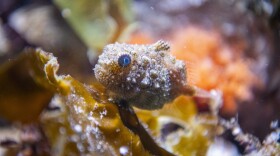One of the touchiest topics in medical research is the use of animals. For example, there are perennial protests at the University of Washington, which has one of the biggest research programs using animals in the country (reflecting that it has one of the largest centers for biological and medical research in the country). About 600 different research projects use everything from rats to monkeys.
The university says animal well-being is a priority, while acknowledging there’s always room for improvement. To that end, the U.W. School of Medicine recently hosted one of America’s best known animal care experts – Temple Grandin.
She’s famous for teaching the beef industry how to be more compassionate, as well as her personal struggles with autism. Grandin is a professor of animal science at Colorado State University.
She gave a series of talks about humane treatment of animals and sat down for a private interview. Two of her favorite themes focus on quality of life and the role of fear.
“One thing I feel strongly about is we’ve got to give an animal a decent life. We've got to look at it and go, 'Does that animal have a life worth living?'”
“[Researchers] need to understand the importance of fear. … One of the things that might be worse than the pain of recovering from surgery is being scared. Like, maybe a particular animal is scared of a particular person, because they did something to it. ... [Fear can be a very strong stressor, which] is one of the reasons why it's so important to train lab animals, especially monkeys and dogs, to cooperate with procedures. You can train monkeys to stick their arm out to get an injection. You can train the animal so you're not forcing it. So you don’t have the fear stress.”
To hear more of Grandin's advice, listen to the full interview.
For its part, the U.W.'s Office of Animal Welfare says it’s already trying to make animals as comfortable as possible. That's been a principle for many years. However, in 2006, the university was sanctioned for housing some animals in shabby conditions, and for not following all required safety protocols. It's also been fined for other violations.
In response, a new plan calls for spending millions on upgrading many of the labs that house animals, Nona Phillips, director of the animal welfare office. That work could get started as soon as next year, pending approval from the state legislature.






